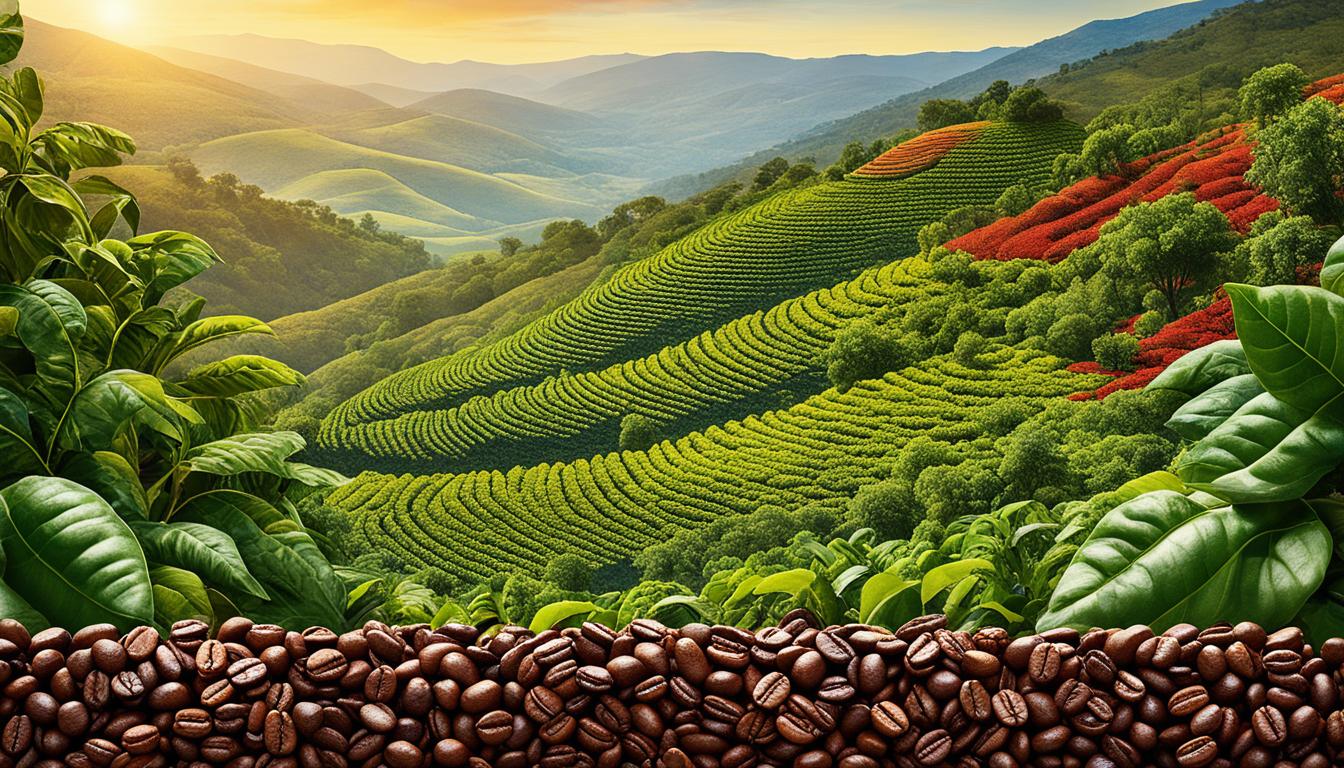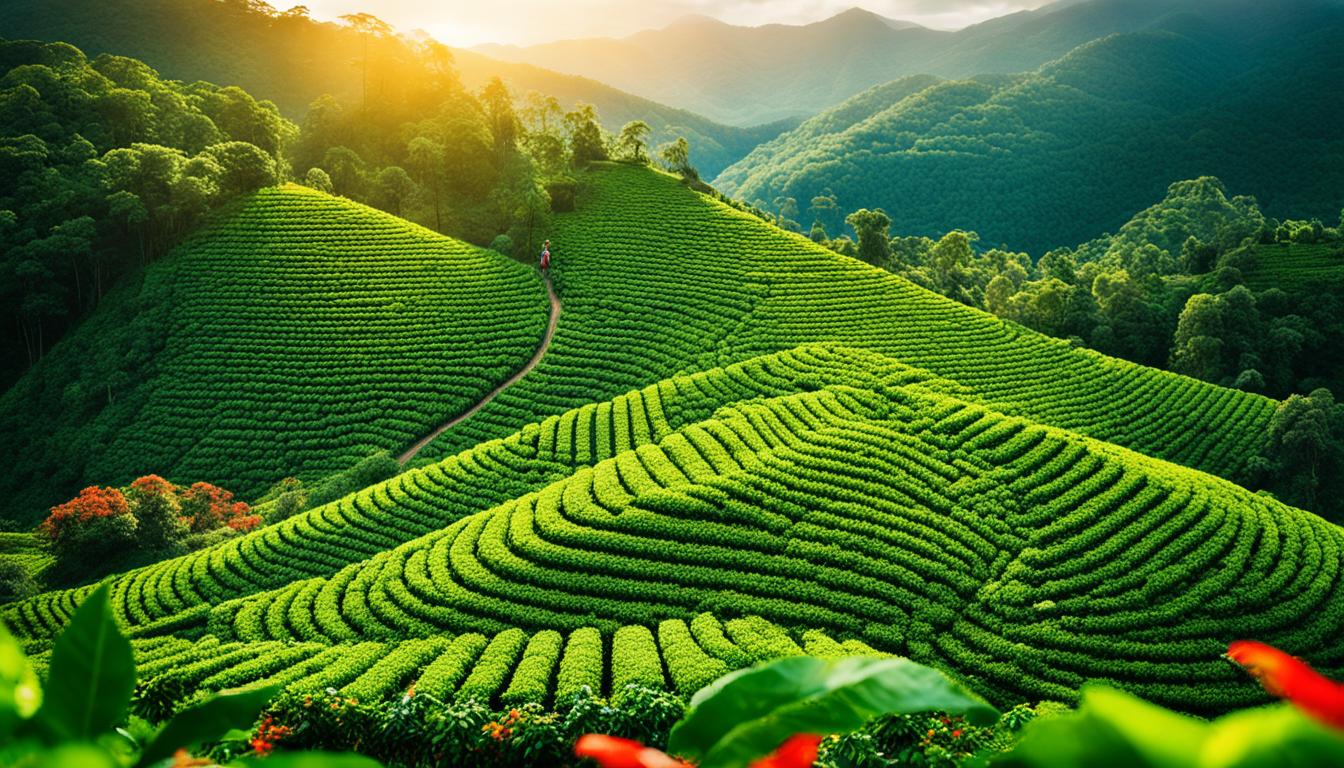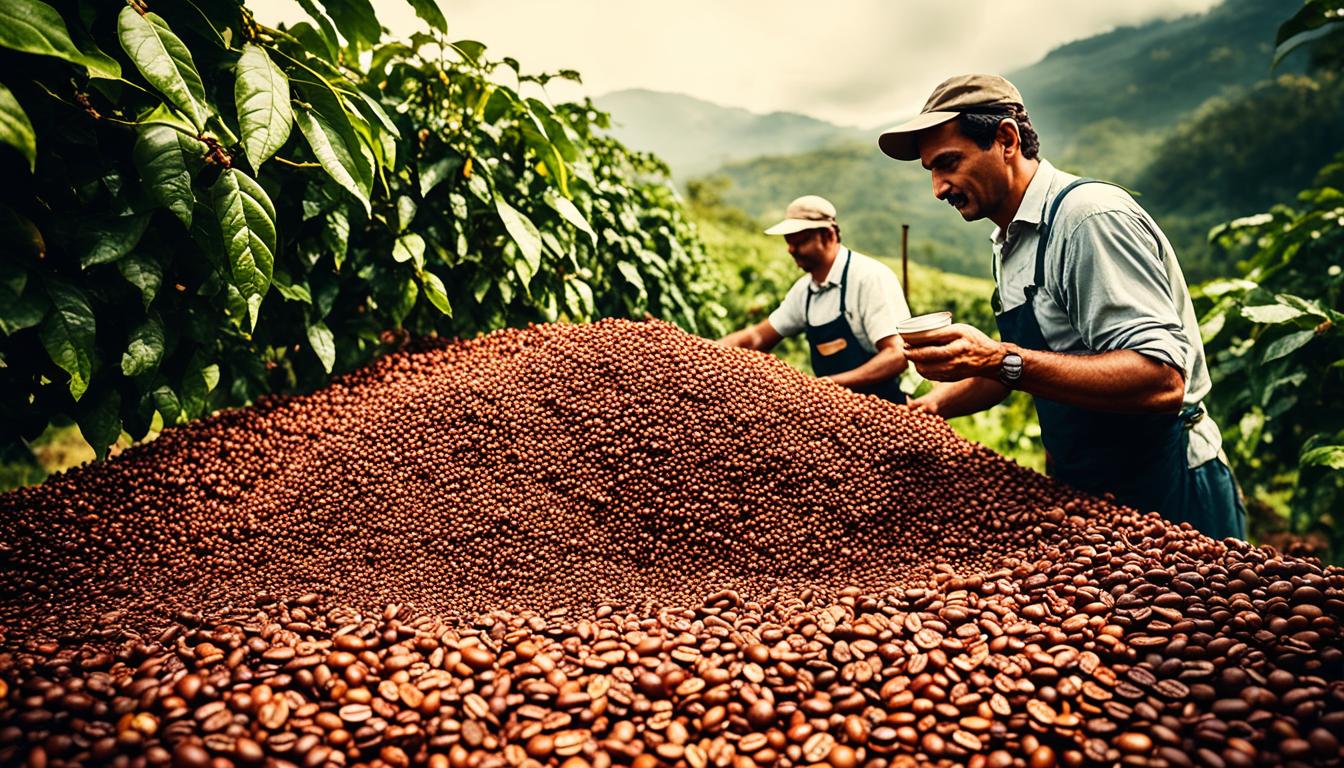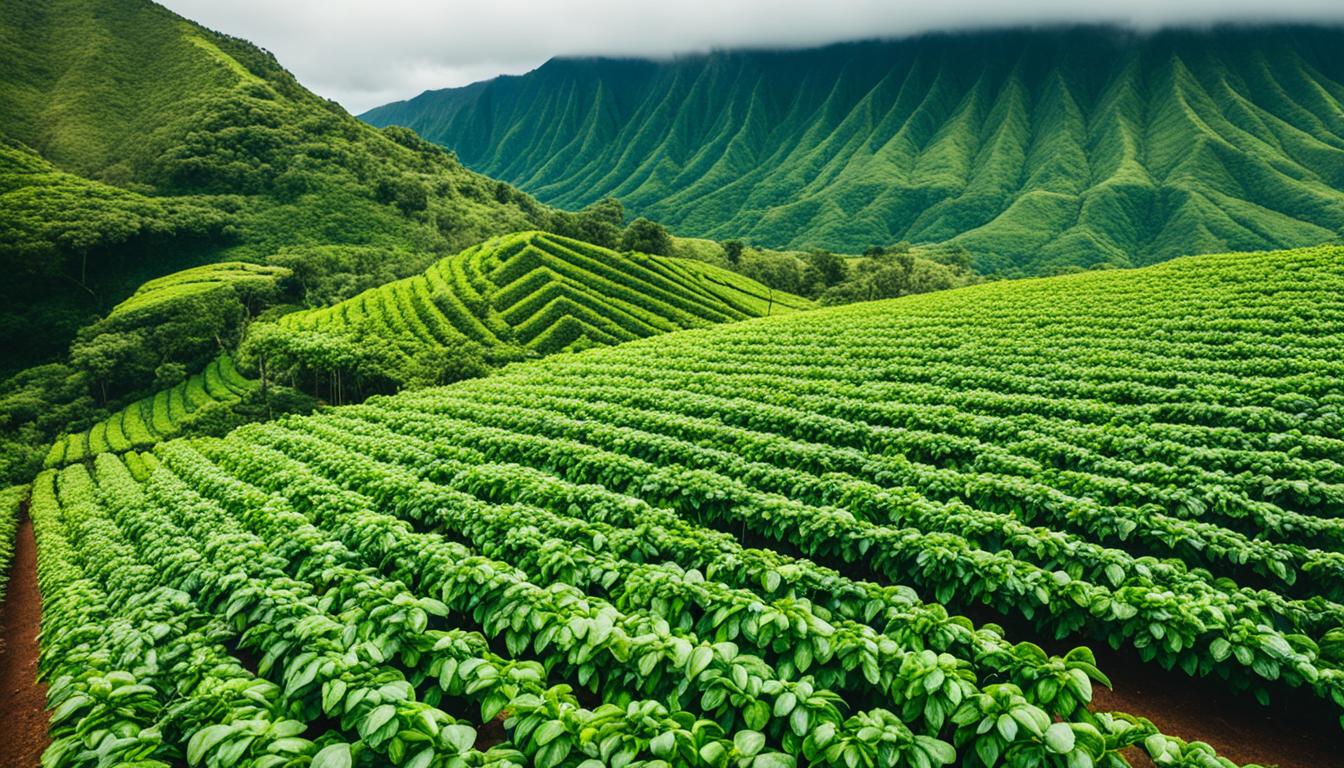Welcome to our blog, where we invite you to join us in savoring the African Coffee Renaissance. The rich and diverse African coffee culture is experiencing a revival, shining a spotlight on the continent’s coffee industry, best African coffee beans, African coffee brands, African coffee production, specialty African coffee, and African coffee traditions. From the bustling coffee shops in Los Angeles that celebrate Black and brown cultures to the vibrant coffee culture in South Africa, there is so much to explore and enjoy on this coffee journey.
Key Takeaways:
- Discover the African coffee culture, showcasing diversity, inclusivity, and unique traditions.
- Explore black-owned coffee shops in Los Angeles that create spaces celebrating local communities and sourcing coffee beans from countries like Ethiopia and Brazil.
- Learn about South Africa’s rich coffee culture with its blend of tradition, innovation, and sustainability.
- Understand how coffee-growing regions in Africa influence the flavor profiles of their beans.
- Embrace the African Coffee Renaissance as a journey that celebrates diversity, tradition, and the art of coffee-making.
Diversity and Inclusion in African Coffee Culture
In African coffee culture, we prioritize creating a diverse and inclusive coffee industry. Black-owned coffee shops in Los Angeles are at the forefront of this movement, offering spaces that celebrate Black and brown cultures. These coffee shops deliberately source their coffee beans from countries like Ethiopia and Brazil, ensuring intentional sourcing and supporting coffee-growing communities in Africa. By doing so, they promote a more diverse and inclusive coffee industry.
These Black-owned coffee shops are not just places to grab a cup of coffee. They are community hubs that provide a safe and empowering environment for everyone. Through various initiatives, they give back to the local neighborhoods, supporting education programs, mentorship opportunities, and community outreach activities.
“Coffee has a rich history in Africa, and it’s important to reclaim those roots and empower Black coffee professionals. We want to break generational curses and create a more inclusive and supportive industry.” – LaNisa Williams, founder of #BlackInBrew
LaNisa Williams, the founder of #BlackInBrew, is a leading voice in raising awareness of Black coffee professionals and their contributions to the coffee industry. She is instrumental in providing education and training opportunities to empower Black coffee professionals and create a more inclusive future for the industry.
By embracing the African Coffee Renaissance and intentionally sourcing coffee from African countries, these Black-owned coffee shops are fueling positive change in the coffee industry. They are amplifying the voices of Black coffee professionals and striving to create a more diverse and inclusive coffee culture for future generations to come.
Exploring South Africa’s Coffee Culture
South Africa’s coffee culture is a fascinating blend of tradition, innovation, and the art of coffee-making. Coffee cultivation in the country can be traced back to the 17th century when it was introduced by European colonial influence.
While South Africa is not a major coffee-producing country, it has several regions that are gaining traction in coffee cultivation. Notable coffee regions include Mpumalanga, Limpopo, and KwaZulu-Natal. Thanks to their sub-tropical climates, these regions have become popular for growing coffee, and local farmers are experimenting with different varieties and sustainable practices.
The journey from bean to brew in South Africa involves careful cultivation, harvesting, processing, and roasting. Local coffee farmers prioritize quality and sustainability, aiming to produce high-quality beans through ethical practices.
The coffee culture in South Africa is also known for embracing unique brewing methods. One such method is the traditional “Boer Coffee” preparation, offering a taste of South African heritage. In addition, innovative brewing techniques like Aeropress and syphon brewing have gained popularity among coffee enthusiasts.
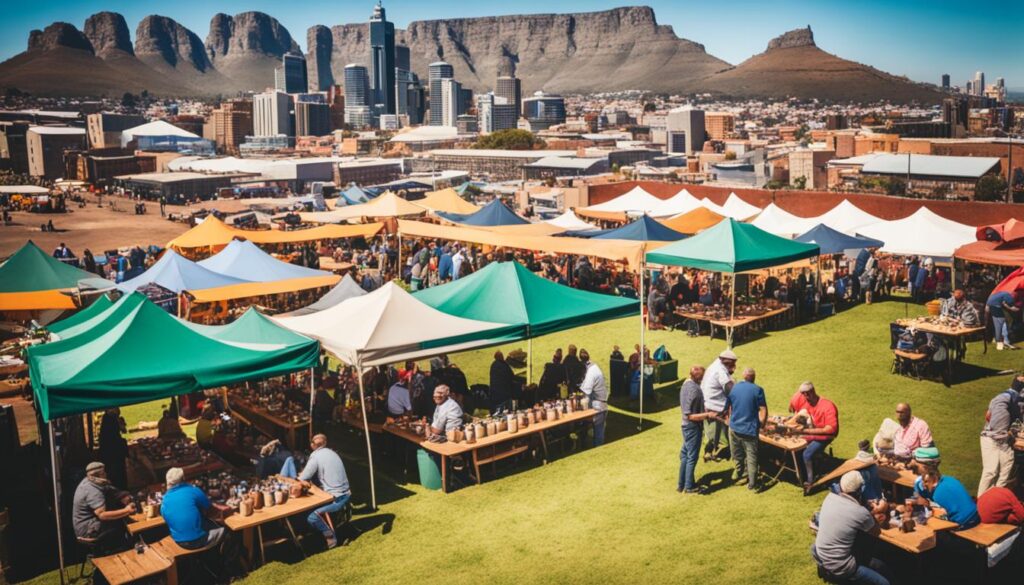
Through its rich history, diverse coffee regions, and unique brewing methods, South Africa’s coffee culture adds a vibrant flavor to the African Coffee Renaissance. The country’s commitment to sustainable practices and the pursuit of quality contribute to the continual growth and evolution of the coffee industry in South Africa.
The Influence of Coffee-Growing Regions on Flavor Profiles
The flavor profile of coffee is heavily influenced by the region in which it is grown. Each coffee-growing region around the world has its own unique characteristics that contribute to the distinct flavors and aromas found in the beans.
The coffee Arabica plant, known for producing high-quality beans, thrives in specific growing conditions. These conditions include abundant rainfall, moderate ambient temperatures, and nutrient-rich soil, which are most commonly found within the Coffee Belt. The Coffee Belt encompasses parts of Africa, the Caribbean, Central and South America, and the Asian Pacific, making it an ideal region for coffee cultivation.
Coffee from different regions within the Coffee Belt exhibits a wide range of flavor profiles. For example, Ethiopian coffees are known for their zesty and fruity flavors, while Central American coffees, such as those from Costa Rica and Guatemala, offer bright and citrusy notes. Jamaican Blue Mountain coffee is revered for its smooth and mild taste. Colombian coffees are often described as well-balanced with a nutty undertone, and Indonesian coffees, like those from Sumatra, have earthy and robust flavors.
Understanding these flavor profiles allows coffee lovers to broaden their palate and explore new coffees from different regions. By trying coffees from various coffee-growing regions, we can appreciate the unique characteristics of each cup and discover new favorites.
Additionally, it’s important to note that each coffee-growing region has its own optimal harvest season, which is when the beans are at their peak flavor and quality. Timing coffee purchases to coincide with the optimal harvest seasons ensures that you’re getting the freshest and most flavorful beans.
Explore the diverse flavors of coffee from different regions within the Coffee Belt and embark on a sensory journey with each cup.
Flavor Profiles of Coffee-Growing Regions
| Coffee-Growing Region | Flavor Profile |
|---|---|
| Ethiopia | Zesty and fruity |
| Costa Rica | Bright and citrusy |
| Jamaica | Smooth and mild |
| Colombia | Well-balanced with a nutty undertone |
| Indonesia | Earthy and robust |
Conclusion
The African Coffee Renaissance is a celebration of the rich coffee culture and traditions of the continent. From vibrant Black-owned coffee shops in Los Angeles to the journey from bean to brew in South Africa, the African coffee industry exemplifies diversity and innovation. As the industry continues to grow and evolve, it embraces inclusivity, uplifting Black coffee professionals, and creating spaces that celebrate African coffee culture.
South Africa, despite not being a major coffee-producing country, has a fascinating coffee culture that blends tradition and innovation. From the 17th century, when coffee cultivation was introduced by European colonial influence, to the present day, South Africa’s coffee production has seen a rise of boutique farms and a focus on local, sustainable coffee. The journey from bean to brew in South Africa involves careful cultivation, processing, and roasting, resulting in high-quality beans and a commitment to sustainable and ethical practices.
Understanding the flavor profiles of different coffee-growing regions is crucial for coffee enthusiasts. African coffee-growing regions like Ethiopia, Kenya, and Rwanda, along with other regions in the Coffee Belt, produce coffees with distinct characteristics. From zesty and fruity Kenyan coffees to bright and citrusy Central American coffees, each region offers a unique taste experience. By appreciating and exploring these flavor profiles, coffee lovers can embark on a journey of taste and discovery.
Embracing the African Coffee Renaissance means embracing diversity, tradition, and the art of coffee-making. Whether sipping on a cup of Ethiopian coffee or exploring the coffee scene in South Africa, this renaissance celebrates the rich cultural heritage and flavors of Africa. Let us raise our mugs and toast to the African Coffee Renaissance!
FAQ
What is the African Coffee Renaissance?
The African Coffee Renaissance refers to the resurgence and celebration of African coffee culture, traditions, and the coffee industry in Africa.
What is the significance of Black-owned coffee shops in Los Angeles?
Black-owned coffee shops in Los Angeles are at the forefront of creating inclusive spaces that celebrate Black and brown cultures and intentionally source coffee beans from African countries like Ethiopia and Brazil.
How do Black-owned coffee shops give back to the community?
Black-owned coffee shops give back to the community through various initiatives, including education and training opportunities for Black coffee professionals and supporting local neighborhoods.
What is the coffee culture like in South Africa?
South Africa has a rich coffee culture that combines tradition and innovation. While not a major coffee-producing country, it has regions known for coffee cultivation, and local farmers are experimenting with different varieties and sustainable practices.
How does coffee cultivation in South Africa differ from other countries?
Coffee cultivation in South Africa involves a journey from bean to brew that includes careful cultivation, harvesting, processing, and roasting, with a focus on producing high-quality beans through sustainable and ethical practices.
How does the region in which coffee is grown influence its flavor?
The region in which coffee is grown has a significant influence on its flavor. Factors such as climate, soil, and altitude contribute to the unique characteristics and flavor profiles of coffees from different regions.

